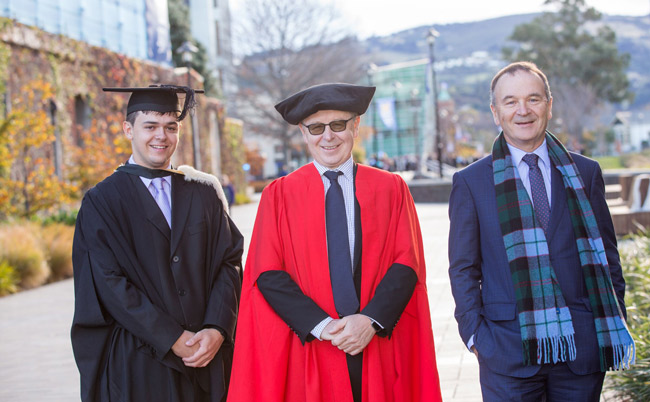
The Honourable Justice Forrest Miller (centre) received an honorary doctorate degree from Otago during one of the University's two graduation ceremonies on Saturday, alongside his nephew Campbell Miller (left) who received his Bachelor of Commerce degree, and watched by his brother, Campbell's father, James Miller (right). Photo: Sharron Bennett.
For the Honourable Justice Forrest (Forrie) Miller it's hard to put into words how much it means to receive an honorary Doctor of Laws degree from the University of Otago.
He was recognised for his contribution to the modernisation of the New Zealand court system.
“I just really can't convey the sense of pride and honour. I feel like I owe a lot more to the University still. It made such a difference to me starting out. It really handed me my career and to be honoured by it now is quite extraordinary.”
It was especially meaningful as it happened alongside his nephew, Campbell Miller, who received his Bachelor of Commerce, majoring in International Business and minoring in Japanese. The pair received their degrees at the 4pm graduation ceremony on Saturday.
Born in South Otago in 1956, Justice Miller gained a Bachelor of Arts (History) from Otago in 1978 and a Bachelor of Laws with honours in 1981.
"I just really can't convey the sense of pride and honour. I feel like I owe a lot more to the University still ... It really handed me my career and to be honoured by it now is quite extraordinary."
Justice Miller describes graduating with honours as an accident – legal practice got in the way of completing it, but following an illness which landed him in hospital he completed his dissertation during 10 days recuperation.
After his studies he worked in Alexandra for Bodkins Solicitors and in the mid-1980s moved to Wellington to join the leading commercial firm Chapman Tripp, where he worked in a range of general practice areas, including commercial and public law litigation (specialising in securities) and regulatory and competition law. He became a partner at the firm in 1987 and later chairman of the firm.
He was appointed to the High Court of New Zealand in 2004, and to the Court of Appeal in 2013.
In 2013 he also became one of the first New Zealanders to receive the Australian Institute of Judicial Administration Award for Excellence. The award jury recognised his efforts establishing the Earthquake Commission list, created in 2011, which was aimed at reducing the burden on the courts system by dealing with cases efficiently in the wake of the Christchurch earthquakes.
All case-managed conferences – where judges and lawyers meet before the litigation process to resolve differences – were managed by Justice Miller until his appointment to the Court of Appeal in 2013.
Before his appointment to the Court of Appeal the Judge was heavily involved in reforms which reducing waiting lists for civil hearings in the High Court.
Justice Miller has been instrumental in developing electronic casebooks, which are now routinely used for hearings in the Court of Appeal. He chairs the Judicial Reference Group, which is a cross-bench committee working with the Ministry of Justice to modernise the court system by, among other things, developing an electronic filing and case management system for all New Zealand courts.
He also chairs the Judicial Libraries Management Board, which exercises governance responsibilities over the quality of judicial libraries. The Board's current focus is on improving judges' access to electronic resources, to ensure they have access to important works from the judicial library. Justice Miller was surprised to be recognised for work that was mostly out of the public eye.
Justice Miller continues to be proud of his association with the University and has maintained strong links with the Faculty of Law, returning often to judge student competitions. He has also engaged with research in the Faculty, including a 2018 Legal Issues Centre report on delays in the High Court to which he contributed feedback and expertise.
He describes Otago as a “world-class” place to study law, with his own graduating class producing a “remarkable” number of judges.
“It's a tribute to the teaching.”
Justice Miller has also served as chairman of Unison Networks Ltd, the electricity distributor for the Hawke's Bay, Rotorua and Taupo regions, and as chair of the Wellington Girls' College Board of Trustees.
The Miller family's association with Otago continues with the younger generations.
Campbell says the biggest driving factor behind him choosing the University was his family's connection to the University.
"Our family's always been patriotic to Otago [University]."
“Our family's always been patriotic to Otago [University].”
When he began studying both of his siblings were in Dunedin, and having that support system in place helped the “scary” transition from home life to student life, he says.
After completing his studies last year he moved back to Auckland. He is now looking for an internship, with the hopes of finding something in Japan.
Meanwhile, Campbell's father James Miller was at graduation to support both his son and brother in receiving their degrees. The University of Otago alumni is the chairman of the NZX stock exchange. Much like his brother he has had a distinguished career in his field.
Later this year he will be the Executive in Residence in the Department of Accountancy and Finance. He will meet with staff and students, speak to classes, and present a guest lecture as part of the Otago Business School's Visiting Executive Programme (VEP) seminar series.
His career has included working for ANZ, ABN AMRO and as head of research at Craigs Investment Partners.
He was formerly a director at Vector and Auckland International Airport, remains deputy chairman of ACC and is on the boards of NZ Refining and Mercury Energy.